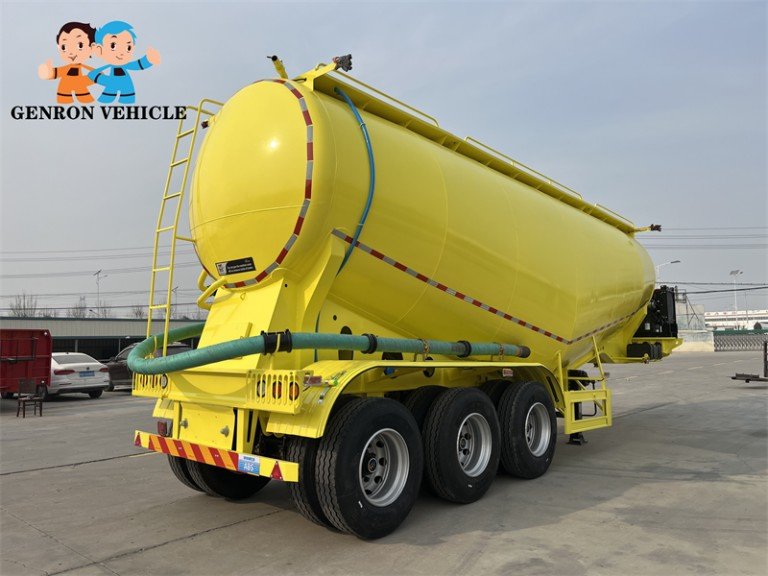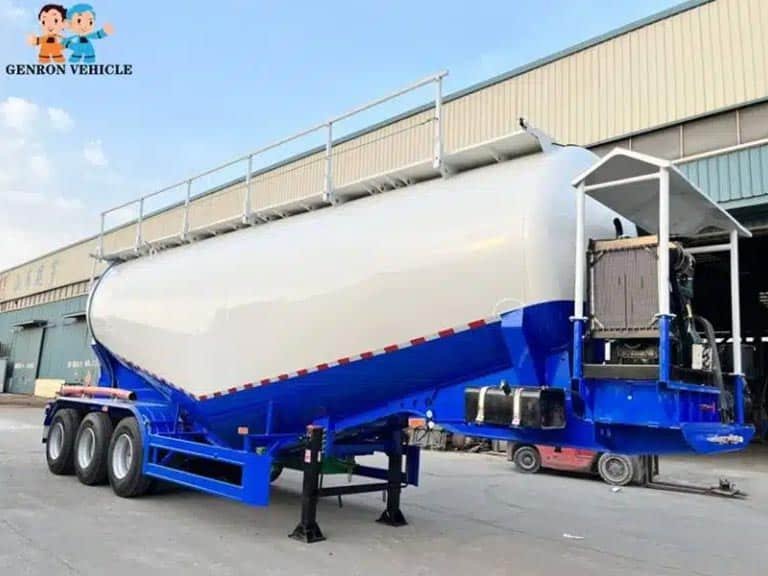Dry bulk trailers are specialized trailers designed to transport huge amounts of unpackaged, dry, flowable material. These commodities, often known as dry bulk cargo, include grains, fertilizers, cement, sand, and other powders or granules. They are vital to businesses such as agriculture, construction, mining, and manufacturing.
Genron International Trade specializes in creating equipment tailored to various industries, from agriculture to construction. Our semi-trailers are designed to transport loose, unpackaged materials like grains and powders efficiently. This is crucial for the logistics industry.
Table of Contents
Understanding Dry Bulk Trailers
Dry bulk trailers are essential in the logistics of dry goods. At Genron International Trade, we focus on designing and manufacturing these trailers for diverse industries.
Definition and Basic Structure
Dry bulk trailers are vehicles for transporting dry, loose materials like grains and powders. They have a segmented design with multiple cone-shaped compartments or hoppers. Each hopper has individual valves at the bottom for controlled unloading.
The tank design varies based on the materials being transported. Different configurations are available for various industries and applications.
Key Components of Dry Bulk Trailers
Our trailers feature manholes at the top for loading and a comprehensive valve system for unloading. They also have a blower system for pneumatic operation and pressure relief valves for safety. Specialized discharge systems are included as well.
The frame is made from high-strength materials to support heavy loads. It maintains structural integrity during transport and pneumatic loading/unloading. We customize these components to meet specific client needs, ensuring optimal performance for particular materials and conditions.
Begin with a bespoke semi-trailer designed for your exact needs. Whether it’s heavy-duty hauling or specialized cargo, we’ve got the perfect solution to keep you moving forward.
What Are Dry Bulk Trailers Used For?
At Genron International Trade, our dry bulk trailers are designed to transport a variety of dry bulk materials. They serve different industrial needs, handling cargo from agricultural products to construction materials and chemical powders.
- Agricultural Products Transportation: Our trailers are crucial for transporting agricultural products like grains and fertilizers. They are designed to minimize damage and contamination during transport.
- Construction Materials Delivery: Dry bulk trailers are vital in the construction industry, transporting materials like cement and gravel. They are engineered to handle heavy loads and are customizable for different construction cargo needs.
- Chemical and Industrial Materials: We also transport chemical powders and industrial materials, including plastic pellets and polymers. Our trailers have specialized features like pneumatic systems for safe and efficient transport.
| Industry | Common Materials Transported | Special Features |
| Agricultural | Grains, seeds, animal feed, fertilizers | Optimized for minimal damage and contamination |
| Construction | Cement, sand, gravel, gypsum | Heavy-duty, customizable |
| Chemical and Industrial | Plastic pellets, polymers, chemical powders | Pneumatic systems, sealed to prevent contamination |
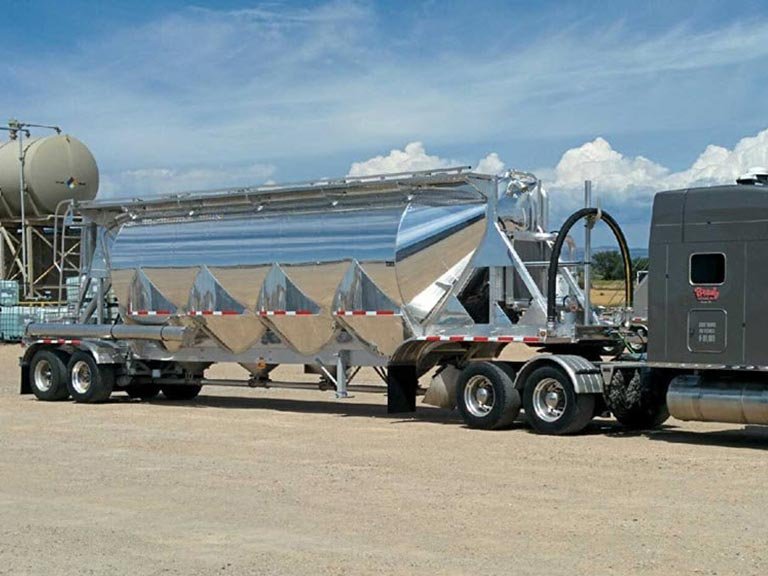
How Dry Bulk Trailers Operate
Dry bulk trailers are at the core of transporting dry goods. They handle everything from agricultural products to construction materials. These trailers are complex machines, designed for efficient transportation.
The Loading Process
The loading process starts with positioning the truck under a silo chute. Materials flow through manholes into the trailer’s hoppers. This fills the trailer to capacity efficiently.
Specialized equipment like transloaders or pressurized air systems aid in loading. They ensure the product is transferred into the trailer smoothly.
Pneumatic Systems Explained
Pneumatic systems are vital in dry bulk trailer operation. They use compressed air to move materials. This system includes tubes, valves, and aerators that fluidize cargo, making it flow like a liquid.
The Unloading Process
Unloading involves opening valves at the bottom of each hopper. This allows the fluidized product to flow out through connected tubes. The rear discharge valve then releases the product from the trailer.
Managing pressure during unloading is key. It prevents clogs and ensures complete discharge.
Operating dry bulk trailers requires precision and care. Advanced pneumatic systems and careful management ensure safe and efficient transportation of dry bulk products.
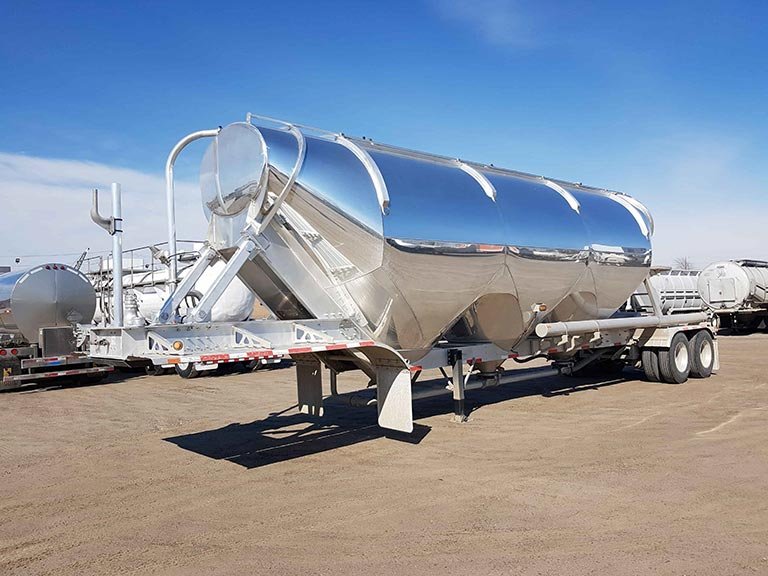
Advantages and Challenges of Dry Bulk Transportation
Dry bulk transportation offers many benefits but also faces challenges. Understanding both sides is crucial for its optimal use.
- Efficiency and Cost-Effectiveness: Dry bulk trailers are designed for efficiency and cost savings. They transport large quantities in one trip, reducing loading and unloading times. This cuts down on packaging and handling costs, benefiting both carriers and customers.
- Environmental Benefits: Dry bulk transportation is eco-friendly. Consolidating loads into bulk carriers reduces carbon footprint. Fewer trips mean less fuel consumption and emissions, aligning with sustainability goals.
Despite benefits, challenges like contamination and weight management exist. We address these with trailer designs for easy cleaning and specialized coatings. Our trailers also have precise weight distribution systems and customizable designs. Driver expertise is essential for handling different materials and pneumatic systems.
Conclusion
The dry bulk transportation industry is evolving, with technology playing a key role. At Genron International Trade, we lead in innovation, developing advanced dry bulk trailers. These include improved materials and smarter monitoring systems.
We see growing demand for specialized bulk carriers as global supply chains focus on efficiency and sustainability. Customization will be crucial, with our ability to create trailers tailored to specific needs.
Our focus on weight optimization, environmental considerations, and safety will drive future innovations. We aim to support trucking companies with the equipment and expertise needed for efficient bulk freight operations.
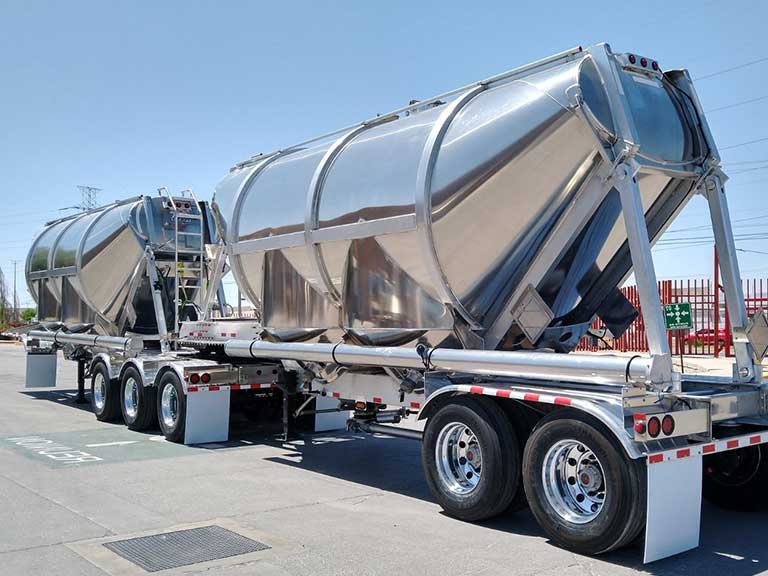
FAQ
What types of products are typically transported using dry bulk trailers?
We transport a variety of products, including sand, plastic pellets, and other industrial materials, using our dry bulk trailers.
How do pneumatic systems facilitate the unloading process?
Our pneumatic systems enable efficient unloading by using compressed air to convey products from the trailer to the desired location.
What safety measures are in place during the loading and unloading process?
We implement various safety measures, including secure valves and manholes, to ensure safe loading and unloading operations.
Can dry bulk trailers be customized for specific industries or products?
Yes, we offer customized dry bulk trailers tailored to meet the unique needs of various industries, including construction and agriculture.
How do trucking companies ensure the secure transportation of dry bulk cargo?
We take several precautions, including proper cargo securement and regular equipment maintenance, to ensure safe transportation.
What are the benefits of using dry bulk trailers for material transportation?
Our dry bulk trailers provide efficient and cost-effective transportation solutions, reducing the need for multiple trips and minimizing environmental impact.
How do hoppers and tanks contribute to the overall functionality of dry bulk trailers?
The design and construction of hoppers and tanks play a crucial role in ensuring the safe and efficient storage and transportation of dry bulk products.


